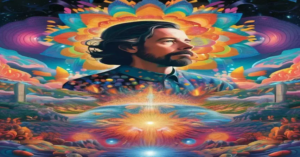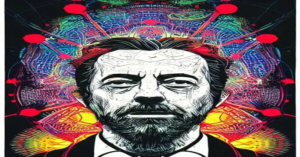Alan Watts on the Meaning of Life | Timeless Wisdom That Will Change How You Think
Alan Watts: The Philosopher Who Taught Us to Dance with the Universe

In an age of noise, confusion, and infinite scrolling, there’s something about Alan Watts that stops you mid-scroll. His voice—part lullaby, part lightning bolt—feels like a long-lost friend whispering through your soul. His words don’t just inform; they disarm. They don’t tell you how to live—they make you feel alive.
To understand Alan Watts is not merely to study a man. It is to wander into a mirror and see the shape of your own existence ripple into new, playful dimensions. He wasn’t a guru, though many tried to crown him as such. He wasn’t a monk, though he walked in reverence. He wasn’t a saint, though his words calmed saints and sinners alike. Alan Watts was, in the truest sense, a performer of truth—a cosmic bard spinning silk from paradox.
The Roots of Restlessness
Born in 1915 in Chislehurst, a quiet suburb in England, Alan was never the boy to settle for simple answers. His mother was religious, his father rational. Somewhere between the two, Alan carved a path through paradox. By his teens, he was deep into Eastern philosophy. Zen, Taoism, Vedanta—all filtered through the lens of a young boy who wasn’t trying to escape life but understand it.
He emigrated to the United States in his twenties and briefly served as an Episcopal priest. But Alan’s spirit wasn’t built for pulpits and stained glass. He wanted the sky open, the mind expanded. So he left the church—politely, respectfully, but completely—and plunged into the waters of comparative philosophy.
Watts was drawn to the idea that truth wasn’t something you possessed. It was something you danced with. In Zen, he found a sense of play. In Taoism, a gentle flowing. In Vedanta, a blurring of boundaries. In every tradition, he unearthed a recurring echo: that the self is not a separate entity but a wave of the vast ocean of life.
Voice of the Counterculture
By the 1950s and ’60s, America was cracking open. The rigidity of post-war life gave way to psychedelics, Eastern spirituality, and a hunger for meaning beyond materialism. Alan Watts became a voice—not just for the counterculture, but for the inner culture of millions.
He lectured in smoky halls, under redwoods, beside crackling fires. He recorded hundreds of talks—on radio, cassette, and in the hearts of listeners. His voice became a sort of medicine for modern madness.
One of his most famous teachings was the illusion of the separate ego. According to Watts, we’ve been tricked into thinking we are isolated selves living in a universe that is other. But in truth, we are the universe—looking back at itself through human eyes. Just as an apple tree “apples,” the universe “peoples.”
This wasn’t some poetic metaphor for Watts. It was a lived reality. If you listened closely, you could hear the cosmic giggle behind every word he said.
Alan Watts : The Power of Paradox
Watts’ genius lay not in explaining complexity, but in exploding it. He used paradox not to confuse, but to liberate. He would say things like:
“Trying to define yourself is like trying to bite your own teeth.”
“Muddy water is best cleared by leaving it alone.”
“The menu is not the meal.”
These weren’t riddles. They were keys—unlocking the mental cages we didn’t even know we lived in. He invited people to let go of control, to trust the flow of life, to understand that letting go isn’t a defeat, but the beginning of real freedom.
He often quoted the Tao Te Ching, savoring its quiet wisdom:
“The way that can be spoken is not the eternal Way.”
Watts knew that some truths were too vast for language—and that was okay. The point wasn’t to define life, but to live it.
A Human Mystic

But let’s not canonize him too quickly. Alan Watts was no ascetic. He loved wine, laughter, and good conversation. He had affairs. He was married multiple times. He struggled with his responsibilities, with his addictions, with the very human mess of being human.
And yet, perhaps that is what made him all the more compelling. He didn’t speak from a mountain top. He spoke from the middle of the dance floor. He didn’t claim purity. He claimed presence. He was not without contradiction—he was contradiction, incarnate, and he made peace with that.
For Watts, the point was never perfection. It was awareness. To be fully present in the moment, whether that moment was beautiful, broken, or both.
Legacy That Breathes
At the age of 58, Alan Watts died in 1973 . Some say it was too soon. But maybe Watts himself would have disagreed. After all, he often spoke of death as not the end. But the return. Like the crest of a wave returning to the ocean.
Decades later, his voice continues to ripple across podcasts, YouTube videos, and meditation apps. Never Young people who saw a world without Wi-Fi now listen to this British philosopher in the quiet of their earbuds. Why?
Because even in this hyper-digital age, Watts touches something timeless. So he reminds us of what we forget:
- That the point of life isn’t to arrive anywhere.
- That meaning arises not from control, but from surrender.
- That being “you” is not a mistake—it’s the entire point of the universe in this moment.
Alan Watts : The Eternal Invitation
Here Perhaps Watts’ greatest gift wasn’t his knowledge. But his invitation. Then he didn’t want you to believe in him. So he wanted you to believe in being. To trust that the rhythm of the universe is already within you. That you don’t need to climb toward enlightenment. Only you need remember what you already are.
“You are the big bang, the original force of the universe, coming on as whoever you are.”
What a radical, liberating idea.
To be alive is not to chase purpose like a carrot on a stick. To be alive is to wake up now. To hear a bird sing and know that it, too, is the voice of God. To laugh, not because life is easy, but because it is so beautifully absurd.
That was Alan Watts’ religion—not a set of rules, but a way of seeing. A way of being. And in a world that often asks us to shrink, conform, or perform, Watts asked something more daring:
Be the whole damn universe, dancing in a body that breathes.
And maybe—just maybe—that’s all the meaning we ever needed.